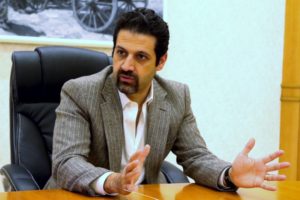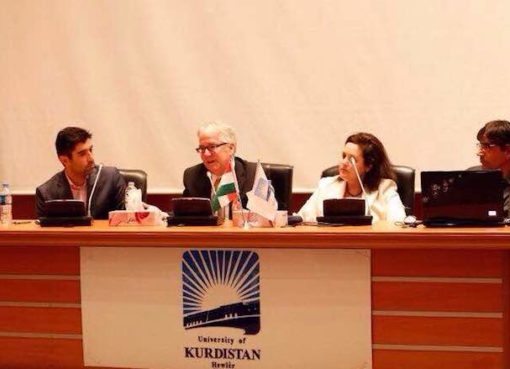If the semi-autonomous government goes bankrupt, the war against the caliphate could go belly-up.
Iraqi Kurdistan’s fight against ISIS has for many Kurds been an existential battle central to their survival and that of their autonomous region in Iraq. However, with ISIS prevented from embarking upon Kurdistan’s major towns and cities, thanks to the efforts of the Kurdish Peshmerga forces and the U.S.-led military coalition against the jihadists, the Kurds face what their deputy prime minister, Qubad Talabani, describes as the “real existential threat”—the region’s economic crisis. If this situation does not improve soon, ISIS will be the least of its problems. Indeed, it is often overlooked that, as a result of the crisis, Iraqi Kurds are now found among the deluge of refugees and economic migrants from the Middle-East into Europe.
Sitting in an office in Sulaymaniah, and armed with a pen and whiteboard, Talabani, who is overseeing major economic reforms, explained to us how the Kurdistan Regional Government (KRG) faces an economic challenge of staggering proportions. Beginning in 2014, he describes how “we were hit with an economic tsunami which came in four waves.” The first of these came in February 2014, when the Iraqi government in Baghdad, which has been in dispute with the Kurds over a number of issues, unilaterally cut the KRG’s share of the federal budget.
This was followed by the emergence of ISIS and its foray into Iraq in June 2014, which led to increased security and military spending and was followed by a massive influx of 2 million refugees and internally displaced persons into Kurdistan.The final hit was the global drop in oil prices that began in mid-2014, which the KRG failed to plan for during its boom years of 2006-2014 when the price of oil hovered at around $100 a barrel.
Before recent reforms began to take hold the KRG was grappling with a monthly deficit of around $406 million per month. Government employees have suffered pay cuts and civilian staff are only paid every five months, while those working in the security services receive theirs every four. A senior Kurdish intelligence official involved with all aspects of the war on ISIS, from recruiting informants to covert special operations, told us that the crisis threatens to “stall the successful momentum against ISIS” that the Kurds and the international community have recently enjoyed.
 Iraqi Kurdistanís Deputy Prime Minister Qubad Talabani speaks during an interview with Reuters in Erbil, January 14, 2016.
Iraqi Kurdistanís Deputy Prime Minister Qubad Talabani speaks during an interview with Reuters in Erbil, January 14, 2016.
The crisis, as most politicians in the region would admit, could have been less severe. Kurdistan’s two ruling parties, the Kurdistan Democratic Party (KDP) and the Patriotic Union of Kurdistan (PUK), sustained a system of patronage that, among other things, involved providing superfluous jobs in exchange for political support. This form of artificial job creation—a small village school or hospital, for example, may have up to 40 government paid guards — has had a devastating impact on the economy.
The KRG also appears to be paying so-called “ghost-employees,” whereby certain arms of the state claim more staff than they have so as to inflate their budgets. Of a population of 5.2 million, 1.4 million are on the government payroll, a clearly unsustainable wage bill. Last year, this amounted to $795 million per month. In addition, the KRG has for too long provided its oil industry with massive fuel subsidies and has relied on expensive diesel for power generation.
What will it take, then, to recover the situation? As a sub-state entity, the KRG does not have the advantages that states have when trying to rescue their economies. It has no track record in debt and is therefore not able to borrow its way out of this crisis. Furthermore, no international fund can come to its aid and provide the sort of bailout packages that have saved countries like Greece. Instead, the KRG has had to rely solely on fiscal management and reform.
Only a tiny proportion of the population pay taxes in the KRG, so among the first steps to offset the loss of oil revenue was to begin a push to collect, rather than raise, taxes. Additionally, all civilian government pay scales have been hit, with junior staff facing pay reductions of 15 percent, going up to 75 percent for senior positions. Beyond the pay cuts and freezes, fuel subsidies have also been reduced and power production is gradually being shifted from diesel to natural gas, with parts of the power grid also beginning to be farmed out to independent companies. The measures have yielded some positive results. By January of this year, the wage bill was reduced by 39 percent to around $480 million a month. The monthly deficit, according to Talabani, has also already been reduced to around $108.4 million.
It is hard to imagine many other populations in the world that would put up with months without pay, and some analysts point out that if this were to happen in Baghdad, the government there would have faced overwhelming social unrest and may have even collapsed. Baghdad, in comparison, is on edge as demonstrators have mobilized against the state to protest the lack of services and jobs. This mobilization has taken place at the behest of radical cleric Muqtada al-Sadr, who has threatened armed confrontation against the Iraqi government unless things improve.
Kurdistan, however, has proven to be far more resilient. The experience of generations of repression and struggle and a strong collective memory and history are certainly reasons for the maintenance of relative social stability in the region so far. The undoubted effectiveness of the reforms has also led to a feeling of cautious optimism that has begun to allay fears and reduce tensions.
The KRG still has a long way to go before it recovers, and the crisis has been a wake-up call that is spurring structural reforms which have been a long time coming, even if these will take a while to fully take hold. In the meantime, there is plenty the West can do and Kurdistan is too important to fail. It shares a roughly 1,000-kilometer border with ISIS and is fighting an enemy that otherwise would likely be turning even more of its attention and resources to international terrorism.
In other words, the KRG’s war on ISIS is also the international community’s war and the state of its economy will have a direct impact on the national interests of Western nations. That means that it must consider providing the KRG with more of the financial support it desperately needs to stabilize its economy so that it can fund this fight and prosper. This does not have to come at the expense of reform. As the U.S. and the European Union have done before, funds can be provided on a conditional basis. That will further incentivize reform, generate economic growth and ultimately position Kurdistan so it can sustain itself in the longer run.
(*) Dr. Ranj Alaaldin is an Iraq Specialist at the LSE and Associate Fellow at the International Centre for the Study of Radicalisation (ICSR) & Dr. Alexander Meleagrou-Hitchens is head of research of the International Centre for the Study of Radicalisation and a lecturer at King’s College London.
Source: The Daily Beast, April 11, 2016








Toronto, Canada participated in the trade forum between Canada and Iraq in 11/4/2016